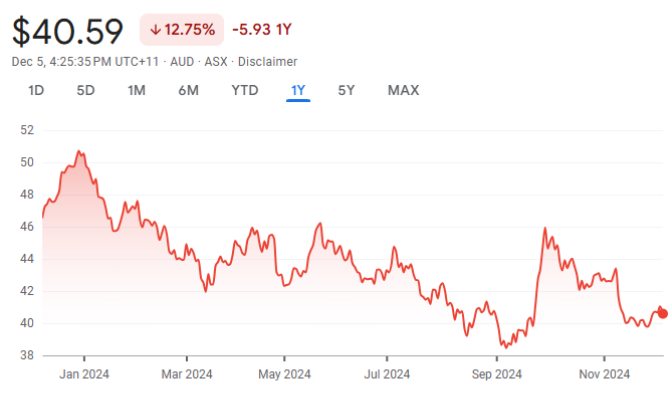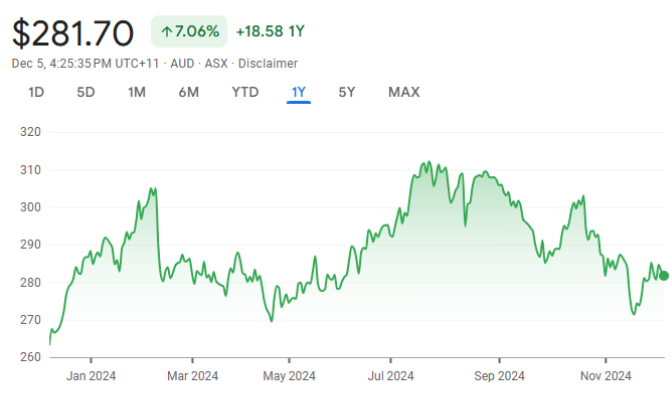ASX blue chip shares are essential for a stable and diversified investment portfolio. These stocks represent the largest financial services companies on the Australian Stock Exchange (ASX). They offer younger investors investment benchmarks and a combination of reliability, steady income, and potential growth.
In 2025, investing in Australian blue chip shares has become increasingly relevant to major banks and companies due to global economic uncertainties, challenges, and ever-shifting stock market dynamics. Let’s explore what makes these stocks a vital part of your financial strategy to create a dependable business model.
What Are ASX Blue Chip Shares?
ASX blue chip shares are the foundation of Australia’s stock market. They represent the largest and most well-established companies listed on the Australian Stock Exchange. These large-cap companies are characterised by their financial stability, established market dominance, and proven track record of delivering consistent ASX pay dividends to shareholders. They are typically leaders in their respective industries, boasting substantial market cap, access to research reports, and a history of strong credit ratings.
One of the defining features of blue chip shares is their ability to generate reliable income through paying dividends regularly. This makes them particularly attractive to income-focused investors, such as retirees or those seeking passive income streams. Moreover, their resilience during market volatility and economic downturns enhances their appeal among risk-averse investors.
On the ASX, blue chip companies belong to a diverse range of industries, including mining, finance, healthcare, and retail - but tend to dominate those categories. For example, BHP Ltd. (ASX: BHP) is the largest miner on the ASX and one of (if not) the largest in the world, while CSL (ASX: CSL) is a biotech behemoth. Wesfarmers (ASX:WES), Woolworths (ASX:WOW) and Coles (ASX:COL) dominate the consumer staple space. The Big 4 Banks could all be described as blue chips too.
These companies exemplify the profitability, operational excellence, and long-term growth potential that define multiple blue-chip stocks, making them a vital component for a diversified portfolio.
Why Invest in Blue Chip Stocks in Australia?

Stability
Blue chip companies like BHP Group Limited and CBA have demonstrated resilience across economic cycles, offering dependable financial performance. In FY2023, BHP’s revenue reached USD 53.8 billion, reinforcing its stability.

Dividend Income
Most Australian blue chips pay high dividends; for instance, CBA delivered a total dividend of AUD 4.65 per share in FY2023. Regular payouts help investors combat inflation and maintain income streams, which is especially appealing during economic uncertainty.

Lower Risk
Blue chip stocks tend to exhibit reduced volatility compared to smaller firms. For example, CSL maintained steady growth amid market fluctuations, securing its status as a safe, reliable investment option.

Steady Growth Potential
Companies like CSL and BHP consistently innovate and expand, driving long-term appreciation. CSL’s R&D expenditure rose to USD 1.22 billion in 2023, ensuring a pipeline of growth opportunities.

Diversification
Adding blue chips like Rio Tinto to a portfolio balances high-risk assets, reducing overall volatility while maintaining growth potential. Rio’s international mining operations diversify both income sources and gain exposure.
Get the Latest Stock Market Insights for Free with
Stocks Down Under & Pitt Street Research
Join our newsletter and receive exclusive insights, market trends, investment tips, and updates delivered directly to your inbox. Don't miss out!
A Unique Way to Invest in Blue Chip Shares: Exchange Traded Funds (ETFs)
For those looking to invest in blue-chip shares but finding it difficult to select individual stocks or purchase several at once, an alternative is to invest in Exchange Traded Funds (ETFs). ETFs provide a simple and cost-effective way to gain exposure to multiple blue-chip stocks through a single transaction.
ETFs that focus on blue-chip shares offer broad exposure to Australia's largest and most stable companies, which can include a mix of banks, resource companies, and retailers. Examples include the Vanguard Australian Shares Index ETF (VAS) or iShares S&P/ASX 200 ETF (IOZ), which track the performance of the ASX 200, giving investors access to top blue-chip companies like BHP, CBA, and Telstra. These ETFs also provide diversification, spreading investment risk across multiple sectors and companies, reducing the impact of poor performance from any single stock.
In addition to diversification, ETFs often come with lower fees compared to blue chip fund, making them an attractive option for investors looking for a more hands-off approach while still benefiting from the stability and growth potential of blue-chip stocks.
3 Best ASX Blue Chip Shares to Invest in for 2025

BHP Group (ASX: BHP)
Broken Hill Proprietary, BHP (which stands for Broken Hill Proprietary) is a a mining and resources titan and continues to be a top pick due to its strong financial performance and strategic focus on critical commodities. In FY24, BHP company's annual reports showcase a revenue of US$55.7bn and a net profit of US$7.9bn.

Commonwealth Bank of Australia (ASX: CBA)
Commonwealth Bank is Australia’s largest bank by market cap, offering stability and paying dividends consistently. CBA has for a few years now persistently recorded bumper profits of over A$10bn, and paid dividends of over $4.50 per share underpinned by strong retail banking operations and a robust mortgage portfolio.

CSL (ASX: CSL)
CSL, a global biotech leader, continues to excel in delivering life-saving therapies and vaccines. In FY2023, CSL achieved revenue of USD 13.31 billion, driven by strong demand for immunoglobulins and influenza vaccines.CSL’s R&D expenditure reached USD 1.22 billion in 2023, underscoring its commitment to innovation...
3 Best ASX Blue Chip Shares to Invest in in 2025
Pros and Cons of Investing in Blue Chip Companies Australia
Investing in Australian blue chip stocks offers both advantages and disadvantages. Here's an updated overview as of January 2025:
Pros:
Blue chip corporations, such as the Commonwealth Bank of Australia (ASX: CBA), have demonstrated resilience during economic downturns, providing investors with a sense of security.
Cons
Blue chip stocks typically have a lower growth rate compared to smaller, emerging companies, potentially leading to more modest returns.
How to Choose the Right ASX Blue Chip Stocks
Selecting the best ASX stocks requires a focused strategy and awareness of current market trends. Here's how to make informed decisions in January 2025:
Examine balance sheets for profitability, debt levels, and cash flow stability. In FY2023, BHP has reported a robust net profit of USD 13 billion, demonstrating its financial strength. Companies with solid financials can weather economic uncertainties and provide steady returns.
How to trade or invest in ASX-listed blue chip stocks
Investing in ASX-listed blue chip shares involves several key steps:
Choose a reputable online share trading platform that offers access to the Australian Securities Exchange (ASX). Ensure the platform provides user-friendly tools and competitive fees.
FAQs on Investing in Blue Chip Stocks Australia
Blue chip shares are stocks of large, financially stable companies with a history of solid performance, consistent dividends, and dominant positions in their industries. Examples include BHP Group, CBA, and CSL.
Our Analysis on ASX Blue Chips Stocks
Here are our 6 Best ASX Stocks for 2025 and why you should give them a look!
Here are our 6 Best ASX Stocks for 2025! Opthea (ASX:OPT) Its been a long wait, but 2025 will…
5 ASX stocks with the highest PE multiples and 5 ASX stocks with the lowest PE multiples!
5 ASX stocks with the highest PE multiples Note: All figures are in AUD and for FY25 unless otherwise stated…
Here are 6 of the best performing ASX shares in 2024! Will they maintain the momentum in 2025?
Here are 6 of the best performing ASX shares in 2024! Mesoblast (ASX:MSB) – up 527% How about this for…
Is Karoon Energy (ASX:KAR) a ‘falling knife’, too risky to invest in or both? Or maybe neither?
Investors who bought Karoon Energy (ASX:KAR) during the depths of the pandemic would be please, but investors who bought at…
Is a February rate cut from the RBA back on the table? There is hope
Mortgage holders hopefully of a February rate cut are a little more hopeful than they were a week ago, but…
ANZ Bank Has Got a New CEO: What Will It Mean for Investors?
ANZ Bank has got a new CEO! Earlier this week, the bank announced that Nuno Matos, the current head of…





